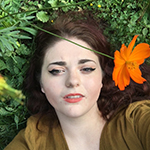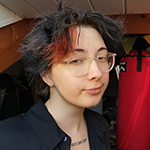let’s try it this way for the last ones
peace living on our own land.
an island, ocean freezes.
berry spots for family.
we kept moving, then settled here,
and the peace was here and it was good.
butter was the emissary
my great-grandfather would walk across lines that he didn’t know were there, across to get butter. and there were other things at the trading store that he walked to in the Arctic with just his thoughts for days and days oh to taste the butter again and to bring it back to his family after walking back again, singing an old song, maybe one forgotten now.
we had their butter and bullets and guns and candy and flour and flour sacks
before we met them.
because of the trading, and we were not in their expansion pack papers.
yet.
we were in the area of the map that they hadn’t eaten.
yet.
their bellies were occupied of trying new ways to
bring an entire People into submission
/we say that they trained all of us to hide who we really are but we never did submit in our hearts, that is why great-granddaughters today transmit signals it is finally safe to tell some of the stories but we did not have the arsenal that they did and the General really didn’t want to kill everyone in the village because they are on some new protocols that the psychologists want to try for their research study and so they /
just moved in.
the worst neighbor ever, like a monster baby that cannot eat enough. the one from the long ago stories. but worse than the old stories.
their elbows poked in every direction and there were no points of negotiation
we were the brown ones that did not speak their language.
yet we understood.
the last heathen savages to tame out on the wild frontiers, the ones on the very edges in the very hidden pockets in the Arctic Ocean, they saw us as something to stomp upon and to play with like a new toy and they get to try new things to press down on their new toy and.
we understood their motions. we could sense their joy in the promise of destruction. it was a never-ending hunger and after us they will have run out of places on the map to eat so this one, t h i s. t i m e
they s a v o r e d us.
they allowed the researchers to come first before they bulldozed all of our sod houses.
to make a runway.
so they could build a huge metal house where our village once was.
this is a true story. we still remember that day that the bulldozers came.
the researchers stripped our grandmothers and grandfathers naked in the name of science when they were just children and put them in an ice cold freezer to see if their young Eskimo bodies were more resistant to cold than their Norwegian bodies or other bodies that they had been prodding at from Africa or wherever they travel as part of the team.
they pinched the fat of our Elders.
with cold, metal utensils.
that is how we knew who they really are.
and you can still look up the study and see the percentage of fat and the skull size of my Ancestor that is just recently passed and.
it wasn’t hundreds of years ago. no.
it was not that long ago.
and I know at this point of the story you might need to go to the bathroom to vomit or maybe you need to laydown and I want you to find it within yourself to keep reading because it is better to take it in all at once like a wash of energy that is felt this is a real part of what happened because today they look at us as drunks and dirty people who need to just get a job and become part of society but we did have a job and we did have a society and everythingwasatpeace and we did remember and do remember the balance and the long long ago stories so when you try to medicine us and tell us we are crazy and unkept and that we cannot stop drinking or smoking weed or pushing our own heads down into the ground it is because of this
wound that YOU created.
and I am not a victim here.
we were in harmony with the land
we had a job and we had no alcohol.
we would gather as a community. many many many many times.
not this solo adventurer thing you try to sell us as a dream.
NO.
we still gather as a community. we still gather as a community. we still gather as a community and we pick the berries and we hunt the animals and share and we still know most all of the old songs and yes some of our people do drink. it is none of your business.
leave us the fuck alone now. to use your language.
or better, fuck you and the horse you rode in on. but these hate words are not our ways, see you have even made the precious great-granddaughter forget her composure for a moment. the true story memories shake stillness. and yes, she carries the still water, the water that is still. she carries the sacred water. still.
the beat of her People push her through the needle.
the beat of her People
push her through the needle.
the beat of her People
p u s h. h. e. r.
t h r o u g h
t h. e. n e e d. le.
holding the still. sacred. water.
the water. is s t i l l
s a c r e d.
w e. still hold.
the sacred water.
still.

Allison Akootchook Warden is an Iñupiaq poet and tribal member of the Native Village of Kaktovik. In 2022, her poem we acknowledge ourselves was featured in the Land Acknowledgements issue of Poetry Magazine, Alaska Quarterly Review published her poem, portal traveler, and her poetry was part of Insidious Rising, a hyphen-labs project for Google Arts and Cultures. Her Twitter poems were part of the 2017 Unsettled exhibition, initiated by the Nevada Museum of Art. She is a 2017 creative writing alumna of the Djerassi Resident Artist Program. She lives in a cabin in Fairbanks, Alaska.

 BACK TO ISSUE
BACK TO ISSUE







